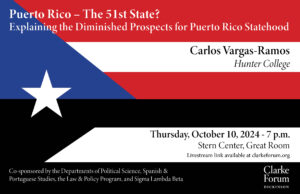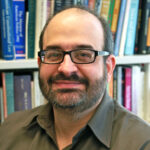 Stern Center, Great Room, 7 p.m.
Stern Center, Great Room, 7 p.m.
Puerto Rico – The 51st State? Explaining the Diminished Prospects for Puerto Rico Statehood
Carlos Vargas-Ramos, Director for Public Policy, External and Media Relations, and Development at the Center for Puerto Rican Studies, Hunter College
This lecture discusses the territorial condition of Puerto Rico in relation to the United States and the unlikely prospects in the near future that Puerto Rico will be admitted into the Union as member on equal standing with other states. In order to address this narrower topic, I will address more broadly the nature of the relation of Puerto Rico and the United States, the historical process of incorporation of the U.S. territories into the Union, the partisan reasons why Congress may not want to incorporate Puerto Rico as a state, the political reasons why a solid majority of residents of Puerto Rico may still not want Puerto Rico to become a U.S. state, the economic, racial and cultural obstacles for Congress to admit Puerto Rico as a state, and the international context that provides little incentive for Puerto Rico’s decolonization.
This program is sponsored by the Clarke Forum for Contemporary Issues and co-sponsored by the departments of political science, Spanish & Portuguese studies, the Law & Policy Program and Sigma Lambda Beta. This program was initiated by the Clarke Forum’s student project managers.
Topical overview written by Layla Ilarraza ’26
Biography (provided by the speaker)
 Carlos Vargas-Ramos is the Center for Puerto Rican Studies’ director for public policy, external and media relations, and development. He is also adjunct associate professor in the Department of Political Science at Columbia University, where he teaches on immigration, race and ethnicity, and urban politics. As social scientist, he has worked on the impact of migration on Puerto Rican political behavior, political attitudes and orientations, as well as on issues of racial identity. A political scientist by training, Vargas-Ramos is co-editor, along with Edwin Meléndez, of Puerto Ricans at the Dawn of the New Millennium published by the Center for Puerto Rican Studies in 2014. He also co-edited with Anthony Stevens-Arroyo, Blessing La Política: The Latino Religious Experience and Political Engagement in the United States published by Praeger in 2012. He is also editor of Race, Front and Center: Perspectives on Race among Puerto Ricans (2017)— a reader on the subject of race, based on a selection of articles in the holdings of Centro: The Journal of the Center for Puerto Rican Studies.
Carlos Vargas-Ramos is the Center for Puerto Rican Studies’ director for public policy, external and media relations, and development. He is also adjunct associate professor in the Department of Political Science at Columbia University, where he teaches on immigration, race and ethnicity, and urban politics. As social scientist, he has worked on the impact of migration on Puerto Rican political behavior, political attitudes and orientations, as well as on issues of racial identity. A political scientist by training, Vargas-Ramos is co-editor, along with Edwin Meléndez, of Puerto Ricans at the Dawn of the New Millennium published by the Center for Puerto Rican Studies in 2014. He also co-edited with Anthony Stevens-Arroyo, Blessing La Política: The Latino Religious Experience and Political Engagement in the United States published by Praeger in 2012. He is also editor of Race, Front and Center: Perspectives on Race among Puerto Ricans (2017)— a reader on the subject of race, based on a selection of articles in the holdings of Centro: The Journal of the Center for Puerto Rican Studies.
He is author of “The role of state actors in Puerto Rico’s long century of migration,” in Anke Birkenmaier, editor, Caribbean Migrations: The Legacies of Colonialism (New Brunswick, NJ: Rutgers University Press) 2020. Among his peer-reviewed articles are “Political Crisis, Migration and Electoral Behavior,” published in CENTRO: The Journal of the Center for Puerto Rican Studies 30(3): 279-312 (2018),
“Puerto Ricans: Citizens and Migrants— A Cautionary Tale,” which appeared in Identities: Global Studies in Identity and Power, 20(6): 665-688, (2013), and “Migrating race: migration and racial identification among Puerto Ricans,” was published in Ethnic and Racial Studies. 37(3): 383-404 (2014).
Vargas-Ramos joined CENTRO as a researcher in public policy in 2001, charged with initiating CENTRO’s policy papers and reports series. As coordinator of CENTRO’s Data Center, Carlos has co-edited State of Puerto Ricans, 2017 and Almanac of Puerto Ricans in the United States, 2016.
He received his B.A. in political science and economics from Rutgers University. He also holds an M.A. in Hispanic civilization from New York University, and a Ph.D. in political science from Columbia University. Prior to joining the Centro’s staff, Vargas-Ramos was a legislative aide in the New York City Council. He has also worked as a research assistant at the Barnard/Columbia Center for Urban Policy and Research as well as an enumerator and manager for the U.S. Bureau of the Census.
